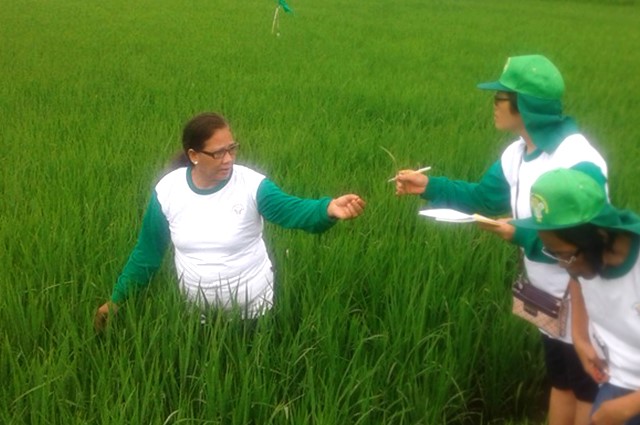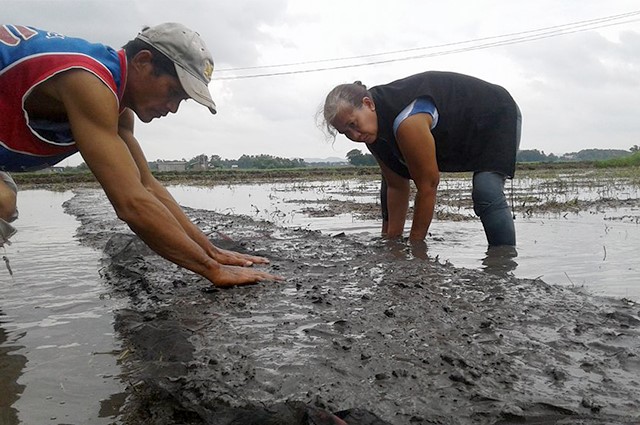 Elizabeth Arceta Sol from Leganes, Iloilo believes that all farmers are capable of becoming a “rice achiever.” After all, she became one. A retired marketing cooperative secretary, Sol received the 2015 Rice Achiever Award, a commendation given by the Department of Agriculture to farmers who make it big in rice farming.
Elizabeth Arceta Sol from Leganes, Iloilo believes that all farmers are capable of becoming a “rice achiever.” After all, she became one. A retired marketing cooperative secretary, Sol received the 2015 Rice Achiever Award, a commendation given by the Department of Agriculture to farmers who make it big in rice farming.
Her story started when she was 28 years old. Her husband, Jerry, convinced her to retire and stay at home to take care of their children. Sol then decided to manage their 2-hectare farm and be a full time farmer and mother.
“At first, I had to hire someone to manage our farm. I listened to all his advice and learned other farming techniques from fellow farmers,” Sol narrates.
“It took me five years to learn the basics, and eventually, I was able to manage my farm on my own,” she adds.
Since then, farming becomes the foundation of her life.
“Farming is the reason our house was built, why my children were able to go to school, and why we have food on our plates. It also helped my husband recover from accident,” Sol explains.
Her hard work paid off and soon enough, their 2-hectare farm grew to 4 hectares.
“It is truly an amazing feeling to start from the bottom, learn the techniques, and see the fruit of what you have sown,” she says.
Integrated farming
 In 1995, Sol’s youngest son JB was born. Later on, they found that he has hearing impairment.
In 1995, Sol’s youngest son JB was born. Later on, they found that he has hearing impairment.
“I had to think of other ways to earn. I had to do everything for my son. Slowly, we were able to establish other sources of income on our farm by Gods’ grace,” Sol tells.
On her 400sqm² vegetable garden, she plants saluyot, cucumber, okra, peanut, and eggplant. This garden provides her P2,000 income a month.
Sol produces their own fertilizers by using cow’s and pig’s manure, and applies them to their organic garden. She also raises livestock, such as swine, cow, carabao, native chicken, turkeys, and ducks. During Christmas, Sol sells 5-10 turkeys for P2, 500.00 per head.
“I like raising native pigs because it requires less capital. I feed them with grass and kangkong from the garden. They also eat fallen mango fruits. Our carabao helps us in the land preparation of our rice farm,” she explains.
For her rice production, Sol manages half-hectare for organic rice, one hectare for hybrid, and another one hectare for seed production. She also maintains a fishpond with tilapia and hito. Because of these additional sources of income, they managed to buy tractors and other farm machines.
Her son JB is now a scholar at the Dela Salle- College of Saint Benilde, and is expected to graduate in 2017.
Role model to her fellow Ilonggos
PhilRice Negros researcher, Arnel Cordova, describes Sol as a regular participant in training programs organized by various government agencies. Sol’s active participation has brought her to farming-related educational tours in Negros, Cebu, Pangasinan, and Vigan.
“She is a true example of a farmer with the right attitude. She is always open to innovations, and tries her best to practice all the best farming techniques,” Cordova says.
Cordova conducts Farmer Field School (FFS) with Sol as the local farmer technician (LFT). Together, they supervise farmers in practicing soil analysis using the minus-one element technique (MOET) and agroecosystem analysis (AESA).
As one of the farmer-cooperators in PhilRice Negros Community Seed Banking, Sol leads in establishing demonstration trials for rice. She heads their Bantay Peste Program and submits reports from five observation stations to their LGU cooperator.
While it is easy to be overwhelmed with achievements and responsibilities, Sol has remained unfazed.
“I am still a student and I am willing to learn for a lifetime.”




